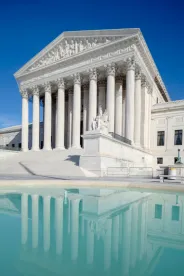The Supreme Court agreed Monday, June 15 to review the Fifth Circuit Court of Appeals’ decision in Dolgencorp, Inc. v. Mississippi Band of Choctaw Indians, 746 F.3d 167 (5th Cir. 2014). The Court’s decision, expected in spring 2016, will likely be a significant addition to the court’s jurisprudence relating to tribal jurisdiction over non-Indians.
Dolgencorp Inc. and Dollar General Corporation (Dolgen) operated a Dollar General store on trust land on the Choctaw Indian Reservation under a lease and business license from the Mississippi Band of Choctaw Indians (Tribe). Townsend, a non-Indian Dolgen employee, allegedly molested John Doe (JD), a minor tribal member while JD worked at the store under a work experience program run by the Tribe. JD and his parents sued Townsend and Dolgen in tribal court. Dolgen and Townsend then sued the Tribe and the Tribal Court in federal court, challenging the tribal court’s jurisdiction. The federal district court granted summary judgment to the Tribe, holding that (1) there was no jurisdiction under the Second Exception identified by the U.S. Supreme Court in Montana v. U.S. because the nonmember conduct did not "imperil the subsistence of the tribal community and tribal jurisdiction thus cannot be necessary to avert catastrophic consequences" but that (2) the Tribe had jurisdiction under the First Montana Exception based on Dolgen’s agreement to participate in the Tribe’ job placement program.
The Fifth Circuit affirmed, rejecting Dolgen’s argument that the First Exception applied only where the nonmember conduct interfered with the Tribe’s internal relations: "[T]he ability to regulate the working conditions (particularly as pertains to health and safety) of tribe members employed on reservation land is plainly central to the tribe’s power of self-government. Nothing in Plains Commerce requires a focus on the highly specific rather than the general." In its petition to the Supreme Court, Dolgen presented the issue as follows:
Whether Indian tribal courts have jurisdiction to adjudicate civil tort claims against nonmembers, including as a means of regulating the conduct of nonmembers who enter into consensual relationships with a tribe or its members?
The Solicitor General of the United States had recommended that the Supreme Court not accept the case for review, arguing that the Fifth Circuit’s decision was correct and that there was no split among the circuits. Since four justices must agree to hear a case, it seems likely that four justices were dissatisfied with the Fifth Circuit’s decision and unpersuaded by the Solicitor.
In Montana v. U.S., the Supreme Court held that tribes normally may not exercise jurisdiction over non-Indians but recognized exceptions where non-Indians enter into "consensual relations" with tribes and their members and where non-Indians engage in conduct that has "a direct effect on, the political integrity, economic security or health or welfare of the tribe". When first announced in 1981, the Montana exceptions seemed to provide ample sphere for tribes’ exercise of territorial sovereignty. Over time however, the Court has steadily encrusted the exceptions with qualifications and corollaries, radically constricting their scope.
While predictions are hazardous, the potential for a decision that will further diminish tribal sovereignty is apparent. The Court’s decision is likely to take its place in the important Montana v. U.S. line of cases defining tribal jurisdiction over non-Indians.



 />i
/>i

